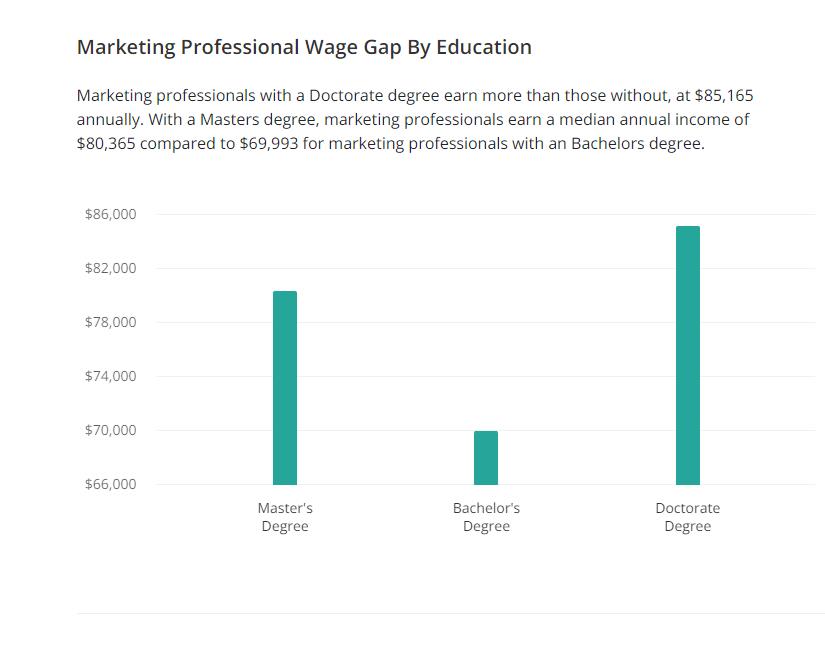
If you’re thinking about getting a degree at any age, it makes sense to think about the value of that degree. Is the qualification needed for the career you want? Are there alternative paths to that career? Can you develop better skills by gaining experience in work?
All of these are perfectly valid questions. After all, getting a degree requires a pretty large investment of both time and money. You want to know that you’ll get enough return on that investment to make it worthwhile.
Why marketing?
When it comes to marketing, a lot of entry-level jobs list a bachelor’s degree as a requirement. That doesn’t mean there aren’t alternate ways to get into marketing but having a relevant degree certainly makes your resume more competitive.
Growth industry
Marketing skills are in demand in the current jobs market. According to a recent report from LinkedIn, marketing job posts grew 63% in just six months last year. Half of those jobs were in the digital and media sectors, meaning digital and content marketing skills are highly valued.
Personal Development & Career Path
The reason for this increased demand for marketers is tied to the rise in digital marketing. New methods of marketing have continued to develop out of the digital sector. This means that marketers capable of creating engaging content or managing social media accounts are needed.
This leaves a lot of room for personal development. Young graduates who are well-versed in social media and community management can hit the ground running in digital marketing. Getting on this path early can lead to content strategist and marketing management positions.
What are the Types of Marketing Degrees?
When we say marketing degree, the term is a bit too general. There are a lot of degree paths that focus on marketing in major or minor ways. The level of degree available will depend on your current education history, but the specific course will be down to your personal choice.
Associate, Bachelor’s, or Master’s?
Recent statistics suggest that 74% of US marketing professionals hold a bachelor’s degree. 9% have an associate degree and 8% have a master’s degree. Here’s a quick overview of the differences.
Associate degrees – 2-year courses that cover marketing and business in a more basic way than bachelor’s qualifications. They’re designed to give students the basic skills needed to apply for entry-level marketing jobs.
Bachelor’s degrees – 3/4-year courses that cover business and economics. There is a range of bachelor’s courses with marketing at their core, but you’ll also cover wider business topics like management, communication, and administration.
Master’s degrees – 2-year courses, usually only available if you’ve already completed a bachelor’s degree. MA or MBA courses are designed to develop a deep understanding of complex business topics. They are highly specific, covering areas like strategic marketing or marketing analytics.

Free to use image from Pixabay
Marketing Specific or Business General?
This is down to personal choice. There are general business degrees that will cover marketing as a module as well as marketing-specific degrees. There are also multiple universities and colleges, both offline and online, offering different course platforms.
If you’re looking at a specific job role or career path, then research which type of degree is most relevant. Remember that you will need to add to your marketing skills if you intend to progress to management roles in the future.
Check the Modules & Curriculum
This is important, and not only because it lets you see which courses align with your career goals. Marketing has changed significantly over the last decade, even more so if you go back to before the digital age. Many business courses are still behind on current marketing trends.
What Jobs Look for a Marketing Degree?
Once you’ve got your marketing qualification, what jobs should you be looking for? Here are some job titles and areas you should watch out for, and what qualifications you’ll need for them.
Entry level
If you’re starting with a degree and no experience, or work experience but no degree, take a look at these roles.
- Sales/customer service roles – These are adjacent roles to marketing where most companies do not ask for prior qualifications. If you don’t have a degree, this is a good place to start.
- Marketing or public relations intern – Another possibility if you don’t have a degree, or you’re still in education.
- Digital/content marketing associate – These roles will almost always require an associate’s or bachelor’s degree. A good grasp of new digital and social marketing techniques will be required to succeed.
- Copywriter/Bid writer – This is a good route into marketing for those with journalism or literature qualifications. These roles combine aspects of marketing, creative writing, and persuasive writing.
- SEO specialist – A more focused form of marketing centered on SEO content optimization. If you know how to optimize a blog post for search engine rankings, this role is for you. Bachelor’s or associate qualifications will be a minimum requirement.
- Social media/community manager – Since these are relatively new roles, we tend to see a mix of degree-qualified marketers and people who’ve had success fostering communities or online brands but don’t have on-paper credentials.

Free to use image from Unsplash
Career Progression
If you have an MA or MBA, or significant experience in one of the above roles, then you can look at these more advanced roles for your career progression.
- Digital Marketing Manager – A role for experienced marketers that involves running campaigns and coordinating marketing associates.
- Senior Marketing Coordinator – A department management level role. Responsible for overall marketing strategy and departmental performance.
- Content Strategist – A specialist role that focuses on content strategy. Designing content plans based on demographic and keyword research are a core aspect of this role.
- Marketing Analyst – This role involves analyzing customer behaviors and market trends. If you want to move into analysis from a more direct marketing role, you’ll likely need specific data analysis qualifications.
- Public Relations Specialist – The public voice of a large organization’s PR team. Managing a brand’s public perception and setting brand-level communication policies like tone of voice.
- Experiential Marketing Specialist – This area of marketing is focused on optimizing the customer experience. Experiential specialists have a deep understanding of customer psychology and behaviors.
- Corporate Communications Manager – Communications managers are responsible for company-wide communications policies. This is an executive-level role that a marketing coordinator or public relations manager might move up to.
Average marketing salaries
Across all the roles we’ve discussed above, salaries vary widely. For those entry-level roles, you could be looking at anything from $25 – $40K depending on the role and your experience.
When it comes to median earnings for marketers with a bachelor’s or master’s degree, we can get a bit more specific. Recent statistics from Zippia show us that $69,993 p/a is the average for bachelor’s degree holders and $80,365 p/a for master’s degree marketers.

Image sourced from Zippia.com
Marketing Degree Pros and Cons
So, the question we asked above was “Is a marketing degree worth it?” Yet, in truth, it’s not a simple yes or no answer. The question you need to ask is “Is a marketing degree right for me?” Here’s a summary of the pros and cons that might give you some answers.
Pros
- Degree holders have better job prospects and higher earnings potential in marketing
- You can study highly specific skills with the right courses
- Gain soft skills like communication and collaboration
Cons
- High time and money investment required
- Diminishing salary returns at higher levels
- Can be a restrictive environment for self-starters and entrepreneurs
What are Marketing Degree Alternatives?
If you want to stick with education but don’t want to invest four years into a degree, then accredited online courses can provide an alternative. This can be your best choice if you wish to upskill in a specific area like running conference calls from Canada.
If higher education really isn’t your thing, the other option is gaining experience. Some businesses prefer internships and training programs for entry-level roles. This allows them to train marketers “their way” rather than re-training someone with more experience.

Free to use image from Unsplash
How to Decide if a Marketing Degree is Right for You
Ultimately, choosing to do a marketing degree depends on your goals, your preferences, and your talents. Consider all three factors before making your choice.
Career Goals
Do you want a management position that needs marketing knowledge? What areas of marketing interest you? What skills do you already possess? Answering these three questions will help you define your career path. That will narrow down your course choices.
If you want to get better at selling small business phone systems in Vancouver, you don’t need a four-year course for that. If you want to develop into high-level marketing roles, then you want that degree.
Personality
You don’t need a specific personality type to work in marketing. Your personality and interests might determine what area of marketing would suit you best though. For example, if you’re outgoing and creative then public relations or social media management might be for you.
Investment & Return
Money isn’t everything. But, if you’re going to put the resources into getting a degree, you want to know that you’ll get some return on your investment. From the figures we quoted above, it seems the “optimal” qualification in terms of salary return vs. time and money investment is a bachelor’s degree.
Average earnings for marketers with a master’s qualification were only $10k higher. This suggests that you’re not really getting a significant financial return for the additional investment. Of course, if that master’s leads to your dream job, you might see it differently.
Final Thoughts: Forge Your Own Path
Is a marketing degree worth it in 2023? The short answer is yes. Whether that means a marketing degree is right for you, we can’t tell you. Hopefully, though, this guide has given you the information you need to make that choice.

The post Is a Marketing Degree Worth it in 2023? appeared first on DigitalMarketer.
Frequently Asked Questions
What keeps an entrepreneur motivated?
Freedom to pursue my goals is my biggest motivator. We live in a world that limits how much we can earn, save money, invest and buy, as well as our ability to borrow, rent, drive or fly. However, these limits do not apply for us. We can pursue our dreams, and make them real.
These limitations cannot be allowed to control us. We can't allow ourselves to be enslaved by these limitations. We are the captains for our ships. We are the architects and creators of our lives.
I am driven by the desire for wealth that is beyond my wildest dreams. To create businesses that surpass the limits of human potential. To create businesses that make a difference in the lives of everyone.
To create more powerful businesses than any government, more influential than any religion, and more enduring than time itself.
That's why you're here. My goal is to help entrepreneurs grow their business faster than anyone else. Because success is for everyone.
What are the six most important questions entrepreneurs should ask?
Motivation is the foundation of any business. You won't get out of bed each morning if you don't have motivation. If you lack motivation, it will be difficult to complete your projects. You won't be able to achieve your goals if you don't have motivation. How can we find our motivation?
You may wonder, "What motivates my mind?" You might be surprised at the answer. You may have been asking yourself the same question for years. You are missing one of the greatest rewards of life--the chance to discover your motivation.
It's the most motivating thing to discover why you are here. You will then realize what drives yourself. You are more clear about your purpose and it becomes more meaningful. What are you passionate about? This will help you stay motivated.
Look within to find your motivation. Ask yourself these questions:
- What am I passionate about?
- What makes my heart beat more quickly?
- What's the thing that makes me happy?
- What gives me butterflies?
- What makes you feel alive to me?
- What keeps you coming back to your projects again and again?
Once you know your answers you'll be in a position to identify your true motivations.
Motivation will be your strength through difficult times. It will help you find the strength you need. It will make you work harder. It will inspire you to be successful.
And if your like me, then you'll never stop trying to find out what your motivations are.
Take some time to reflect on what motivates you. You might be pleasantly surprised at what you uncover.
How to Motivate yourself as an Entrepreneur
To motivate yourself, find someone who is also motivated to do what your goal is. Ask someone who has worked hard towards achieving his goals to tell you how he did it.
Ask for advice, listen, learn and most importantly follow it. Look up successful people to emulate.
Do whatever it takes to become that person. Take their advice. Take their advice. Follow their example.
Keep pushing forward. Keep moving. Never stop learning. Never give up.
Never listen to anyone telling you that you're not capable. Don't listen to anyone who tells you there is no path.
Failure doesn't automatically mean that you are a failure. Failure can make you stronger. To learn more. To push harder.
Failure is only another step on your journey to success.
Start today. Do something today that will help you get closer to your dream.
What are you waiting for?
Why is motivation important for an entrepreneur?
When we feel lost or stuck, motivation is what propels us forward. It gives us the strength to face our fears and make decisions that might seem risky or impossible.
Motivation is also the driving force behind success. If we lack motivation, it can lead to being unmotivated, lazy, unproductive, and eventually, unsuccessful.
To unlock your potential, you must find ways to motivate. It is important to find a way that motivates you throughout the day.
Think of it as a muscle. The harder you exercise it the stronger it gets. If it's not exercised, it will begin to weaken.
Some of the most successful entrepreneurs are self-motivated. They set goals and plan the steps to reach them.
You may find yourself struggling to stay motivated at times. These three steps will keep you motivated.
Step 1) Get inspired. Find someone who inspires and motivates you. Someone who is already achieving what you'd like to accomplish.
Step 2) Set small goals. Step 2) Set small goals. Focus on the next step rather than the ultimate result. You can reach big goals quicker by breaking them into smaller pieces.
Step 3. Reward yourself. When you achieve your goals, reward yourself. A reward doesn't have to be material; it could simply be taking time to do something fun.
Motivation is a choice. Choose happiness, choose success, and live a full life.
Get started today if your goal is to make positive changes in your daily life. Start by deciding to change. Next, take action. Now is the time to live your dreams.
What are the motivations of entrepreneurs?
There are three main types of motivation for entrepreneurs. Each type has its own set of strengths and weaknesses.
The most common form of motivation is external, where an individual wants to make more money. This motivation comes from financial concerns.
External motivation is driven mostly by personal interest, ambition and desire. This type of motivation leads to people who are extremely goal-oriented.
It is rare to find internal motivation. Internal motivation is rare. They don't necessarily seek wealth, but instead pursue other goals like self-development and fulfillment or service to others.
People who have internal motivation are often called "passionate" as they find fulfillment in their work.
Finally, intrinsic motivation is the least common kind of motivation. Intrinsic motivation is a person who finds enjoyment and satisfaction working towards achieving a goal.
Intrinsic motivation is a much stronger motivator than either external or internal motivation.
Inner motivation is a result of the inner self. It's based on the belief in certain talents and abilities. These abilities and talents allow them to achieve things that no one else could.
Realizing our talents and capabilities makes us happy and fulfilled. We feel like we are doing important work.
We are happy when we have intrinsic motivation. This happiness is based on the knowledge that we are capable of achieving anything we set our minds to.
This feeling of accomplishment keeps you going no matter what the circumstances are.
If you don’t enjoy what it is, then why bother?
Click here for more information about motivational entrepreneurship.
What are the 3 motivators of an entrepreneur
Entrepreneurs' three greatest motivations are freedom and money.
- Freedom means freedom. It is having the freedom to do what and when you want. This is why we are entrepreneurs even if our current job or situation restricts us.
- Also, money is very important. Without it we would not consider starting a company. Although we can survive without food and water, we cannot live without money.
- The third motivation is knowledge. Entrepreneurship requires us to constantly learn more and more, which is why we often find ourselves reading books, attending seminars, taking online courses, and learning how to create products and services.
This is what motivates and drives us to reach our goals. It gives us purpose, meaning.
These three elements are why we became entrepreneurs. They are our main driving force that keeps us going day in and day out.
If these three things are missing, we might pack up and go home. If we don't have these three things, we won't ever be truly happy.
Statistics
- According to analysts, Johnson has high appeal in all four quadrants tracked at the multiplex: male, female, over-25 and under-25. (forbes.com)
- I shifted my motivational point from something huge (and undefined) to improve by just 1% each day. (carolroth.com)
- Our 10 years of research also shows that 75% of mentored entrepreneurs increased their revenue, and 82% of their businesses survived the first two years. (carolroth.com)
- That means for $150,000, you could have bought 10 percent of Airbnb." (entrepreneur.com)
- “Life is 10% what happens to you and 90% how you react to it.” (oberlo.com)
External Links
kabbage.com
twitter.com
cnbc.com
- This is Jeff Bezos’s inspirational quote he keeps on his fridge
- Richard Branson, a Billionaire: These are my top 10 secrets to success
due.com
How To
What are 10 ways to motivate employees
Motivation is one of your most difficult tasks. It takes patience, perseverance as well as sacrifice and effort. It's important to learn how to motivate people, and get them to work hard.
It is impossible to motivate someone if they don't know why. If you have no idea why he/she wants to change something, then you can do nothing to help him/her. This article will demonstrate how to motivate your employee by using different methods.
1. Give them the feeling of importance - This is one of the best methods to motivate your employees. This feeling will make them feel valued and special. They should feel that they are doing good work and that their efforts make a difference.
2. Give Recognition - People enjoy recognition. People are more happy if they are given recognition. So, if you want to motivate your employees, ensure you recognize them from time to time.
3. Respect them - Respect is an important component of any relationship. Respecting your partner is key to motivating them. Respecting others is a way to show that you value them.
4. Being open with them is a great way to motivate others. Share information with your employees and you encourage them to be open. When they learn new things they feel happy and proud.
5. Reward people for doing good work. This encourages them and motivates them to continue working hard. But, before rewarding them, you should check whether they did a good job.
6. You should set clear goals. This will motivate your employees and give them something to work towards. Giving them a goal also makes them better workers.
7. Tell Your Employees What's Happening - You may be concerned that telling employees about company plans will waste their time. It's an effective way to motivate your employees. It helps them to know where they should be focusing next by telling them about the company’s plans.
8. Give feedback - Feedback is a great way to increase employee morale. Although giving feedback can take some time, it is worthwhile.
9. Let Them Know Who Their Boss Is -Another powerful way to motivate your employees is by letting them know who their boss is. If they are aware of their boss, they will know where to find them if they have any questions.
10. Ask for Help - This is another way to motivate employees. Asking them for help lets them know they can count on you. They know you care and that you trust them.






